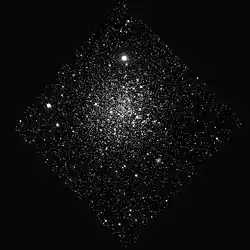NGC 339
NGC 339 is a globular cluster in the constellation Tucana the Toucan. It is located both visually and physically in the Small Magellanic Cloud, being only about 10,000 ± 12,000 light years (3,000 ± 3,000 parsecs) closer than the cloud. It is rather prominent, being the brightest cluster in the southern reaches of the cloud. It was discovered by John Herschel on September 18, 1835.[1] It was observed in 2005 by the Hubble Space Telescope. Its apparent V-band magnitude is 12.12, but at this wavelength, it has 0.19 magnitudes of interstellar extinction.[3]
| NGC 339 | |
|---|---|
 NGC 339 imaged by the Hubble Space Telescope | |
| Observation data (J2000.0 epoch) | |
| Class | ~VIII |
| Constellation | Tucana |
| Right ascension | 00h 57m 45.0s |
| Declination | −74° 28′ 20″[1] |
| Distance | 186 ± 4 kly (57 ± 1 kpc[2]) |
| Apparent magnitude (V) | 12.12[3] |
| Apparent dimensions (V) | 2.2 arcminutes[1] |
| Physical characteristics | |
| Mass | 5.7×104[3] M☉ |
| Radius | 119 ± 3 ly (36.5 ± 0.7 pc[4]) |
| Estimated age | 6.30±0.50 Gyr[3] |
| Other designations | ESO 029-SC 02[2] |
NGC 339 is about 6.3 billion years old. Its estimated mass is 5.7×104 M☉, and its total luminosity is 7.2×104 L☉, leading to a mass-to-luminosity ratio of 0.79 M☉/L☉.[3] All else equal, older star clusters have higher mass-to-luminosity ratios; that is, they have lower luminosities for the same mass.[3]
References
- Seligman, Courtney. "NGC 0339". cseligman.com. Retrieved 9 May 2015.
- "NED search results for NGC 339". NASA/IPAC Extragalactic Database. NASA. Retrieved 9 May 2015.
- Song, Ying-Yi; Mateo, Mario; Bailey, John I.; Walker, Matthew G.; Roederer, Ian U.; Olszewski, Edward W.; Reiter, Megan; Kremin, Anthony (2021). "Dynamical masses and mass-to-light ratios of resolved massive star clusters – II. Results for 26 star clusters in the Magellanic Clouds". Monthly Notices of the Royal Astronomical Society. 504 (3): 4160–4191. arXiv:2104.06882. doi:10.1093/mnras/stab1065.
- "Angular Size calculator". 1728.org. Retrieved 9 May 2015.